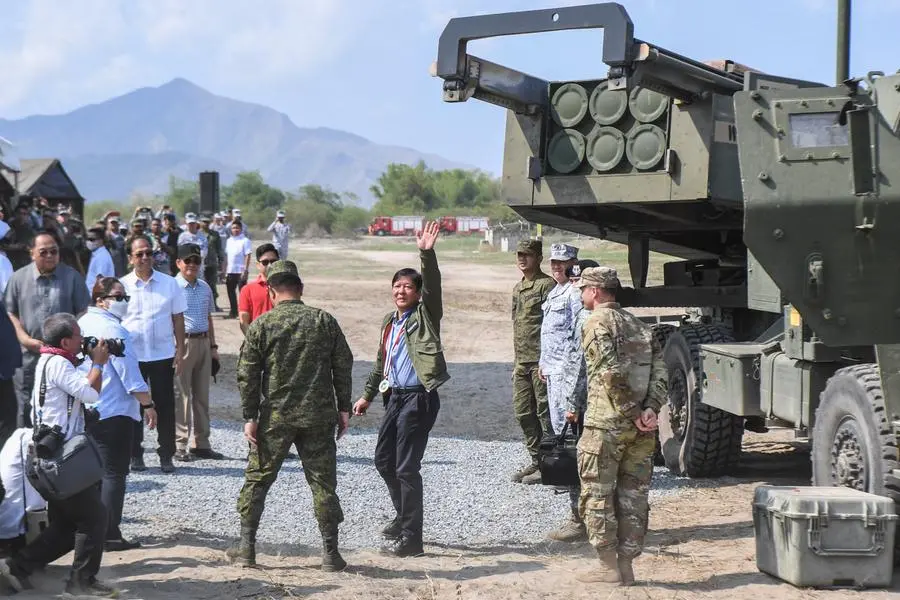PHOTO
Philippine President Ferdinand Marcos left Manila on Sunday for a visit to the United States as he seeks to bolster ties with Washington amid growing tensions with China in the disputed South China Sea.
Marcos's visit comes as the United States had called on Beijing to stop "provocative and unsafe conduct" in the disputed waterway after a recent near-collision with a Philippine coast guard vessel.
Marcos begins his four-day trip with a meeting with US President Joe Biden on Monday at the White House, which the Philippine leader described as "essential to advancing our national interest and strengthening that very important alliance".
"We will reaffirm our commitment to fostering our long standing alliance as an instrument of peace and as a catalyst of development in the Asia Pacific region," Marcos said in a pre-departure statement. His plane took off at around 1:43 pm in Manila (0543 GMT), according to the Presidential Communications Office.
Ahead of Marcos's visit, US State Department spokesman Matthew Miller slammed China over the near collision of one of its coast guard ships with a Philippine patrol boat a week ago, saying it was a reminder of Beijing's "harassment and intimidation" in the contested waterway.
"We call upon Beijing to desist from its provocative and unsafe conduct," he said in a statement, adding that any attack on Philippine armed forces would trigger a US response.
Biden has been working to bolster relations with Asian allies as the US-Chinese relationship remains in a historically deep chill, and the Philippines' proximity to key sea lanes and Taiwan gives it particular strategic importance.
The near-miss on April 23 off the Spratly Islands was the latest in a long string of maritime incidents between China and the Philippines.
Beijing claims sovereignty over almost the entire South China Sea, ignoring an international ruling that its assertion has no legal basis.
- A near-miss -
AFP was one of several media outlets that witnessed the incident after journalists were invited to join two Philippine Coast Guard boats on a six-day patrol of the waters, visiting a dozen islands and reefs.
The Philippine vessels approached Second Thomas Shoal, known in China as Ren'ai Jiao, in the Spratly archipelago.
As one boat, the BRP Malapascua, which was carrying Filipino journalists, neared the shoal, a Chinese Coast Guard vessel more than twice its size sailed into its path.
AFP journalists watched the incident from the other Philippine Coast Guard boat, which was less than a kilometre (0.6 miles) away.
The Malapascua's commanding officer said the Chinese ship came within 45 metres (50 yards) of his boat and only his quick actions avoided the steel-hulled vessels crashing into each other.
The Chinese foreign ministry said Friday that the Philippine boats had "intruded" without China's permission and called it a "premeditated and provocative action".
- Manila pushes back -
But Manila hit back, saying that "routine patrols in our own waters can be neither premeditated or provocative" and insisting they will continue to conduct the patrols.
The near-miss came just a day after Marcos hosted Chinese Foreign Minister Qin Gang for talks in Manila aimed at defusing tensions in the waterway.
Marcos has insisted he will not let China trample on the Philippines' rights in the sea, and has gravitated towards the United States as he seeks to strengthen defence ties.
Early this month, the Philippines identified four additional military bases -- in addition to five existing sites -- to which US forces will have access, including one near the Spratly Islands.
The two countries also carried out their biggest ever military manoeuvres in recent weeks.
This shift has alarmed China, which has accused Washington of trying to drive a wedge between Beijing and Manila.
- 'Ironclad commitment' -
US-Philippine ties were badly frayed under Marcos's predecessor, the authoritarian Rodrigo Duterte.
Marcos has sought to allay public fears that the reviving alliance with the United States could bring the Philippines into the conflict if China were to invade Taiwan.
He has said that with Biden he will discuss the "need to tone down the rhetoric" over the South China Sea, Taiwan and North Korea.
White House spokeswoman Karine Jean-Pierre said this month that Biden intended, in the meeting with Marcos, to "reaffirm the United States' ironclad commitment to the defense of the Philippines".





















